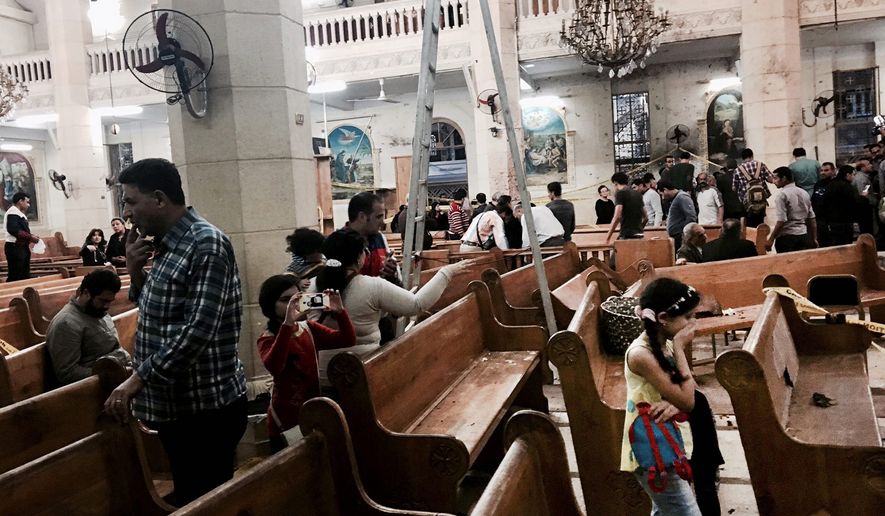Violence against Christians — like the bomb attacks that killed at least 311 people in Catholic churches and hotels in Sri Lanka on Easter Sunday — has been escalating steadily over the past few years, international observers say.
In just the past few weeks, stark reminders of the danger Christians face around the world abound: an underground priest is dragged from his pickup truck in Xuanhua Diocese in China, a Christian couple in India are beaten by a father accusing them of trying to convert his son, 17 Christians are killed during a child dedication service in Nigeria.
Open Doors USA, a mission for persecuted Christians, estimates that violent attacks on the faithful doubled from 2017 to 2018, with approximately 11 Christians dying every day for their faith.
“There’s a specific pattern of violence around Christian holy days, such as Easter and Christmas,” said Sarah Cunningham, senior director of communications for Open Doors USA.
Nearly 50 worshippers were killed on Palm Sunday 2017 by bombers who targeted Coptic Christians in Cairo. That same year, at Bethel Memorial Methodist Church in Quetta, Pakistan, nine Christians were killed a week before Christmas by suicide bombers linked to the Islamic State.
Whereas international organizers tracking attacks against Christians a generation ago concentrated on the officially atheistic Soviet Union, today the focus is on militant and extremist Muslim factions.
“Militant Islamic camps are definitely one of the primary sources of Christian persecution in these countries,” said Ms. Cunningham, noting that Christians are being targeted beyond the former borders of the now-scattered Islamic State in Iraq and Syria.
Sunday’s attacks occurred in largely Buddhist Sri Lanka, where the percentage of Muslims and Christians is in the single digits. News reports suggest that Sri Lankan authorities were slow to respond to growing threats against Christians, who account for less than 8% of the nation’s 23 million people.
“Often these nations lack the resources or the desire to confront [persecution against Christians],” Ms. Cunningham said.
According to the Center for Strategic and International Studies, the main victims of religious terrorism are overwhelmingly Muslim. It reported that of the more than 70,000 deaths worldwide in 2017, 85% were Muslim. Christians represented a fraction of the victims of religiously motivated violence.
Open Doors USA said 4,136 Christians have been killed for their faith since 2018 and 1,200 churches or Christian buildings have been destroyed.
In countries where parishioners face violence for their Christian faith, churches have gone underground or into forests, caves and fields. Parishioners are encouraged to congregate in small groups to private homes, separated by 20-minute increments to avoid suspicion.
Christian organizers promote seclusion and secrecy rather than assertiveness and confrontation for the faithful in regions where religious minorities are threatened.
“We are more likely to work and help a church remain covert and protected,” said Ms. Cunningham, whose organization has helped the Christian girls who were traumatized by Boko Haram captors in Nigeria and Iraqi Christians who returned to a village left in rubble by the Islamic State on the Nineveh Plains.
Jeff King, president of International Christian Concern, an advocacy group for persecuted Christians, said one reason news of attacks on Christians don’t spread widely in the U.S. is because major press outlets are populated with “secularists” who “don’t understand fundamentalism” and are skeptical of or not interested in Christians.
“These stories aren’t filtering down to Americans for the most part,” Mr. King said.
Former President Barack Obama and former Secretary of State Hillary Clinton received criticism Monday over their Twitter messages in response to the Sri Lanka attacks that referred to victims as “Easter worshippers” instead of “Christians.”
Mr. King said he has been buoyed by the response from the Trump administration, including Secretary of State Mike Pompeo, who has “really invested in trying to help the plight of persecuted Christians.”
Open Doors USA maintains a World Watch List of nations engaging in Christian persecution. It notes that anti-Christian hostilities have spread to India, where Prime Minister Narendra Modi’s brand of Hindu nationalism has encouraged discrimination against the democratic nation’s 65 million Christians, and to Russia, whose authoritarian government has become suspicious of non-Russian Orthodox groups, especially evangelists.
This year, Mexico appeared on the watch list, which points out that Mexican drug cartels have victimized pastors and priests who have spoken out against the drug trade.
According to Open Doors USA, Mexican Christians also face persecution and ridicule over political issues, such as abortion, same-sex marriage and comprehensive sex education.
• Christopher Vondracek can be reached at cvondracek@washingtontimes.com.




Please read our comment policy before commenting.